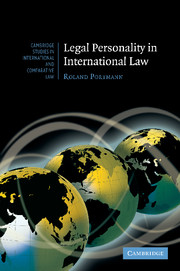Book contents
- Frontmatter
- Contents
- Foreword
- Acknowledgments
- Table of Cases
- List of Abbreviations
- Introduction
- Part I The concept of personality in international law
- Part II The conceptions of personality in international law: their origins and legal manifestations
- 4 Early doctrine and practice
- 5 The states-only conception
- 6 The recognition conception
- 7 The individualistic conception
- 8 The formal conception
- 9 The actor conception
- Part III A framework for personality in international law
- Bibliography
- Index
- Titles in the series
- References
6 - The recognition conception
Published online by Cambridge University Press: 05 October 2010
- Frontmatter
- Contents
- Foreword
- Acknowledgments
- Table of Cases
- List of Abbreviations
- Introduction
- Part I The concept of personality in international law
- Part II The conceptions of personality in international law: their origins and legal manifestations
- 4 Early doctrine and practice
- 5 The states-only conception
- 6 The recognition conception
- 7 The individualistic conception
- 8 The formal conception
- 9 The actor conception
- Part III A framework for personality in international law
- Bibliography
- Index
- Titles in the series
- References
Summary
The recognition conception is a modification of the states-only conception. Whereas it still stipulates the primacy of the state in international law, it accepts that states can recognize other entities as international persons. The origins of this conception lie mainly in the works of Karl Strupp, Arrigo Cavaglieri and Georg Schwarzenberger, all of them paying strict attention to what they perceived as state practice regarding personality. This conception has been widely accepted in doctrine ever since and there might be some merit to the view that it represents the dominant conception of international personality today. One of its most important legal manifestations, though with certain ambiguous aspects, is the Reparation for Injuries Advisory Opinion of the ICJ dealing with the personality of the United Nations. The creation of international organizations in general and the legal issues related to it, as well as the partly direct role of individuals in investment law treaties, can be regarded as manifestations of this conception.
Basic propositions
According to this conception, states are the ‘normal’ persons of international law but are free to recognize other entities as international legal persons:
Es ist nicht zutreffend, wenn viele, z.B. Anzilotti, Corso 69, aus dem Begriffe des Völkerrechts … die alleinige Völkerrechtssubjektivität der Staaten herleiten. Denn derselbe Gemeinwille der Staaten, der bislang die Staaten (aber auch als kriegsführende Partei anerkannte Insurgenten!) als Rechtssubjekte anerkannt hat, kann jederzeit auch anderen Subjekten Persönlichkeit im Rechtssinne verleihen. […]
- Type
- Chapter
- Information
- Legal Personality in International Law , pp. 80 - 125Publisher: Cambridge University PressPrint publication year: 2010

